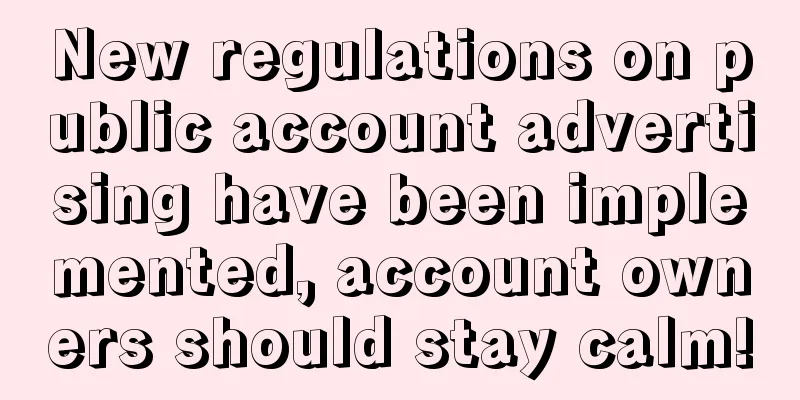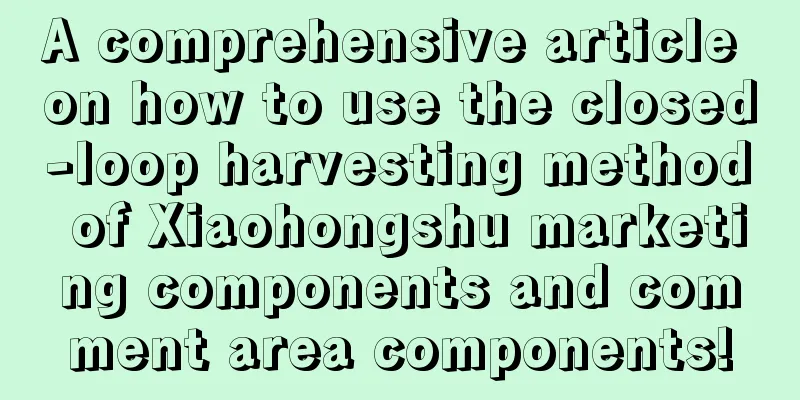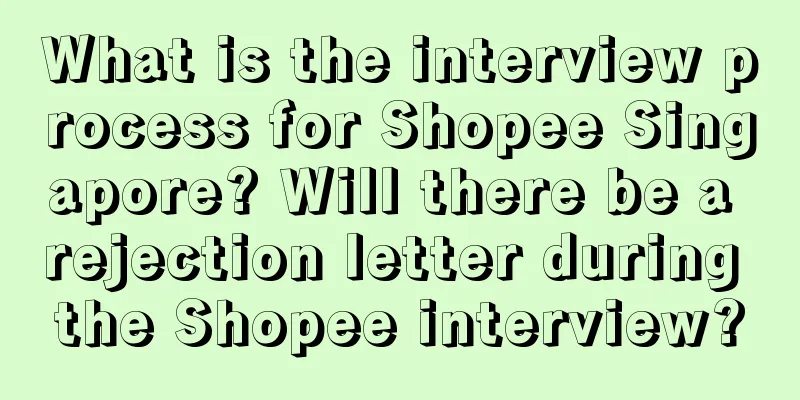New regulations on public account advertising have been implemented, account owners should stay calm!

On July 4, a document titled "【Product News】 WeChat Official Accounts Support the Promotion of Youzan Products" (hereinafter referred to as "Product News") sparked discussion in the industry. It has been just over a month since WeChat released the new regulations "Announcement on Further Regulating Marketing Content on WeChat Official Accounts" (hereinafter referred to as "Announcement") in May. The previous "Announcement" stipulated that some advertisements should be released through Tencent's official advertising platform, Huxuan Ads, after June 30, 2023. Now, the rules for e-commerce have been further refined. (Related concepts and interpretations have been mentioned in Weiguojiang's previous articles. Click on the blue words to review) Although "Product Dynamics" is mainly used as an operating instruction for Youzan product promotion, we can get a glimpse of the future paradigm of WeChat ecological e-commerce from it. 1. New regulations on public account advertising are implementedMore than a month ago, the new rules for public account advertising came unexpectedly. There were many different opinions on how it would be implemented in the e-commerce field, but now the shoe has finally landed. Let me first state the conclusion:
As the first third-party platform to speak out, Youzan stated in its "Product News" that after communicating with WeChat officials, its backend [Commission Promotion (Youzanke)] system was connected to the [Official Account Commission Rebate Product Advertising] channel, and after the transformation was completed, it has supported merchants' products to continue to be promoted in the official account scenario. This document specifically emphasizes that its scope of application is "non-merchant self-promotion scenarios" . So, here it involves the determination of whether the merchant is promoting the scenario. According to the "Instructions for Non-commercial Promotion of Mini Program Related Materials" (hereinafter referred to as the "Instructions") officially updated by WeChat in June, the first thing to do is to confirm whether the official account and the mini program are the same entity. In most cases, the system will automatically identify them. In special cases, it is necessary to submit evidence materials for review. Next, you need to determine whether it is a third-party cooperation. WeChat explains this document as follows:
We extract the keywords of the e-commerce part, which can be understood as: When adding an e-commerce mini program to a public account article to sell goods, if it meets the associated certification conditions mentioned in the "Instructions" and the public account and the mini program are the same entity, it belongs to the merchant's self-promotion scenario and the article can be posted directly for the time being without being affected; if they are not the same entity, you can apply to associate a non-commercial promotion mini program through the public account backend, and you can post normally after the review is passed. However, if it is outside the related certification situations in the "Explanation", it is all non-merchant self-promotion scenarios. Taking Youzan as an example, according to the operating procedures of "Product Dynamics", the merchant side needs to settle in Youzan's "commission promotion"; when the public account owner is editing the e-commerce copy, he needs to search and add relevant products through the "Bring Goods-Commission Rebate Products" path in the navigation bar at the top of the page. In general, if the official account and the mini program are of the same subject or the association authentication is completed in the background, it will be relatively convenient for e-commerce to bring goods. Traffic owners in need can enter the operation page through the "Mini Program Management" on the left column of the official account background. The official account can be associated with 10 mini programs of "the same subject or associated subject" and 3 mini programs of "non-same subject". The following description has been added to the related pages, which also echoes the new regulations:
In addition, there are the following situations that require attention: 1. To promote H5 pages (including QR codes and URLs) on official accounts, you must use the [Official Account Commission Product Advertising] mode. 2. To insert a micro page (a collection of multiple products, not a single product) into a public account article, such as a store homepage, activity page, etc., you need to use the [Public Account Mutual Selection Advertising] mode. 3. When reading the original text in the public account article settings and jumping to the product page, there may be a risk of violation because it contains multiple product recommendations or the domain name and the public account are not the same entity. In summary, with the implementation of the new regulations on public account advertising, e-commerce has also begun to have a basis to rely on. It is obvious to the naked eye that WeChat is rushing forward on the road to standardization without looking back. 2. What are the impacts?The release of this new document still caused quite a stir. As a result, the "agent operation" business may be hit the hardest. Inconsistency in the subject will bring a higher threshold for operation, and the mini-programs with different subjects may not necessarily pass the review. It is indeed troublesome to operate through the "official account rebate product advertising" model. On the other hand, the new regulations have also spawned another monetization model - many original order-taking platforms and officials have obtained the qualifications of traffic-generating MCNs, and invited account owners to bind MCNs to receive orders. This is the product of the game between the original business model and the new regulations, and it is also a projection of the needs of the majority of small and medium-sized account owners. As for whether it works well, it will take time to verify, and everyone should also make careful judgments. The business description of a certain order-taking platform MCN shows that WeChat went to great lengths to do this, and it was certainly not for no reason. In addition to meeting the needs of its own platform risk control, it was also to refine the "rules" of public account advertising and plug the fish that slip through the net. Whether it is to bring brand promotion to the mutual selection advertising platform, or to let product promotion return to its own "sales" module, WeChat is determined to take the public account advertising business back into its own hands this time. For those of us who are in the WeChat ecosystem, the implementation of new regulations has already set off a wave of standardization momentum, and only by operating in accordance with the regulations can we survive. Author: Chen Chumu Source: WeChat public account "Weiguojiang (ID: wjam123456)" |
<<: Cannes award-winning copywriting is here!
>>: Three thoughts on the public account advertising mutual selection platform
Recommend
Do I need to fill in the tracking number for products shipped by Amazon?
For some small and medium-sized sellers, Taobao is...
As mid- to high-end yogurt falls from its pedestal, will the consumer assassin finally be abandoned?
Under the impact of Internet celebrity brands, yog...
How to calculate Amazon product pricing? What are the methods?
If you want to upload Amazon products to your stor...
eBay UK will restore final value fees for electronics and home gardening categories
eBay announced that the fixed portion of the trans...
Can Amazon communicate with sellers? What are the requirements for opening a store on Amazon?
After shopping on the Amazon platform, if we have ...
How will Xiaohongshu’s car brand operate in 2023?
To do a good job in brand marketing, it is very im...
Which is better, Shopify or Etsy? Comparison between Shopify and Etsy
Competition in the domestic e-commerce industry is...
How to use the decoration materials for the Shopee Double 11 promotion? How to create a style?
I have just been approved to join Shopee. How can ...
How to apply for a refund on a Shopee order? Related questions answered
Shopee is a cross-border e-commerce platform with ...
What is Amazon's customer service phone number? Where can I contact customer service?
Like Taobao, Amazon also has official customer ser...
Big news! WeChat official accounts can finally change titles, and also launched the "content boost" function
Yesterday, WeChat official accounts made two impor...
How can cross-border e-commerce open multiple stores? What should I pay attention to when using joint accounts?
In cross-border e-commerce, many friends want to o...
How advanced is the data analysis model of consulting companies?
In the field of data analysis, consulting companie...
Which brands are suitable for the in-house model that saves P&G 10% of media costs?
This article deeply explores the application of th...
If you want to grow your physical store business, don’t just focus on your own business.
Private domain growth needs to be combined with bu...









